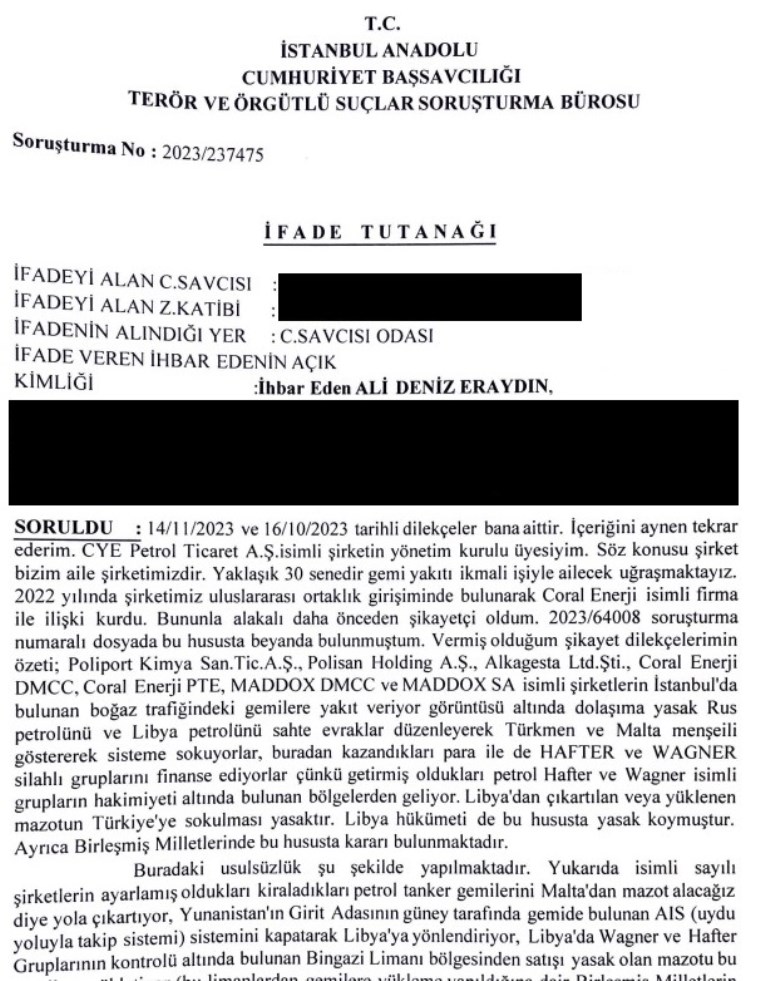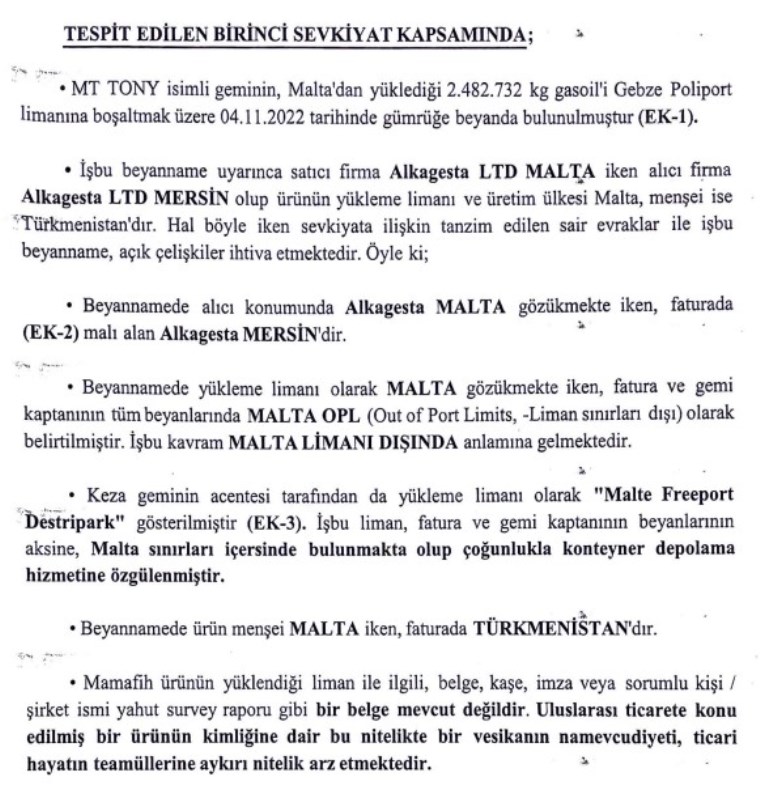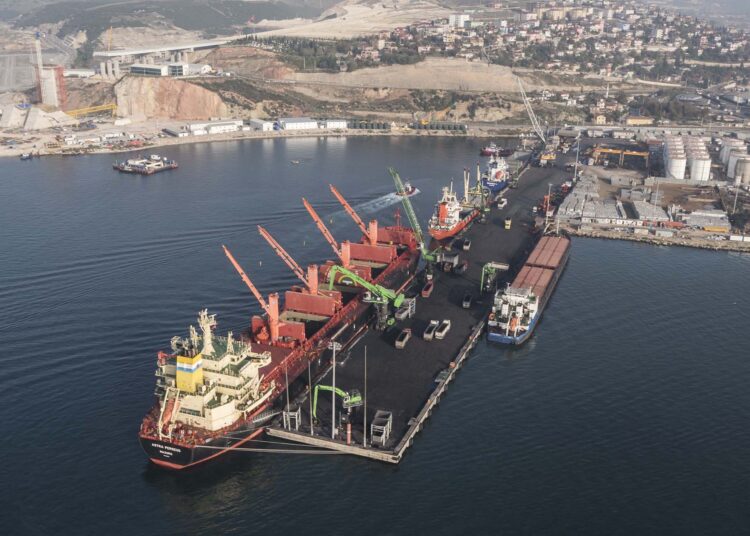Levent Kenez/Stockholm
A Turkish businessman and former chairman of the Turkish Bankers Association has presented compelling evidence to prosecutors, alleging a sophisticated scheme involving the manipulation of oil shipments from territory under the control of Libyan National Army (LNA) leader General Khalifa Haftar.
Ali Deniz Eraydın claims that oil shipments, supposedly sourced from Turkmenistan and loaded in Malta, are part of a clandestine operation. He provided documentation highlighting discrepancies between declared and actual shipment details, raising doubts about the authenticity of the transactions, as reported by journalist Miyase İlknur of the Cumhuriyet daily.
Eraydın’s meticulously compiled dossier, submitted to the Istanbul Terrorism and Organized Crime Investigation Bureau, sheds light on worrisome illegal activities. The evidence includes records indicating the shipment of petroleum products from Malta to Turkey’s Gebze Poliport Port under allegedly false pretenses. Upon scrutiny by Eraydın, these documents reveal inconsistencies in buyer and seller information, loading port designations and product origin.
A detailed examination of multiple shipments reveals a pattern of deception, with discrepancies between declaration documents and invoices, as well as the absence of crucial verification documents related to loading ports. These irregularities not only raise questions about the authenticity of the transactions but also suggest the involvement of organized crime networks.
Despite Eraydın’s detailed complaint filed with the prosecutor’s office, no legal action has been taken against the oil companies allegedly involved, such as Poliport Kimya AŞ, Polisan Holding AŞ, Alkagesta Ltd., Alkagesta Petrol and Agriculture Ltd., Coral Energy DMCC, Coral Energy PTE Ltd., Maddox SA, Maddox DMCC as well as Azerbaijani businessman Anar Alizade.

Eraydın also challenges the purported Turkmen origin of the oil, suggesting that its route through Malta before reaching Turkish ports contradicts standard trade practices. He posits that the oil may actually originate from Libyan territory under Haftar’s control, possibly involving the Wagner Russian paramilitary group. This assertion is supported by corroborating evidence from international sources, adding weight to Eraydın’s allegations.
Alizade, accused by Eraydın, is the owner of RSR Holding and currently owns the infamous Yalıkavak Marina.
Yalıkavak Marina was recently associated with Mehmet Ağar, a former interior minister who allegedly has ties to mafia groups. Following allegations of drug trafficking and smuggling, Ağar, who served as the chairman of the marina’s board, announced his resignation. Ağar is a staunch supporter of President Recep Tayyip Erdogan.
Alizade is involved in various projects as a partner and contractor of Azerbaijan’s national oil company, SOCAR. Several members of his family hold managerial positions in Azerbaijan’s national companies, particularly SOCAR. Originally having the surname Aliyev, he subsequently changed it to Alizade.

A report prepared by the United Nations Panel of Experts on Libya included alarming revelations regarding the smuggling of oil just off the territorial waters of Malta and through ships departing from Maltese harbors in 2018. The report suggested that vessels engaged in smuggling operations often drop anchor approximately 12 nautical miles off the Maltese coast, awaiting opportunities to transfer smuggled fuel to other vessels destined for its final port of call.
Submitted to the United Nations Security Council, the report advocated enhanced measures empowering UN member states to conduct inspections of vessels suspected of fuel smuggling to or from Libya in international waters. It outlines the modus operandi of these vessels, detailing how they depart from Malta bound for the Gulf of Gabes in Tunisia, then deliberately disappear from radar approximately 40 to 60 nautical miles off the Tunisian coast. They subsequently navigate towards Zuwarah in Libya, a primary hub for the illegal exportation of refined petroleum from Libya, originating from the Zawiyah refinery located on Libyan territory.
The findings underscore the urgent need for concerted international action to combat fuel smuggling operations in the Mediterranean region. Enhanced monitoring and enforcement mechanisms are crucial in disrupting these illegal activities and upholding maritime security and stability.
Turkish President Erdogan, known for his close ties to the UN-backed Government of National Accord (GNA), stated in 2020 that they were closely monitoring attempts by Haftar, whom he describes as a coup plotter, to sell oil from his own region through illegal channels to acquire more weapons and mercenaries. However, it seems unlikely that oil from Haftar’s region could be introduced to the domestic market without the knowledge of the Turkish government.
Haftar’s attempt to seize Tripoli was abruptly halted after Turkey intervened with the supply of multi-purpose Bayraktar TB2 drones, manufactured by Turkish company Baykar Makina, led by Erdogan’s son-in-law, Selçuk Bayraktar.
Beyond ideological support, Erdogan openly acknowledged the strategic importance of Libya’s oil and gas resources to Turkey. During a joint news conference with former Libyan prime minister Fayez al-Sarraj in Ankara on June 4, 2020, Erdogan unveiled plans to expand cooperation, including exploration and drilling operations, to harness natural resources in Libyan territory.
In November 2020 Turkey and the GNA signed a military cooperation pact and a maritime demarcation deal. While the maritime agreement, not recognized by any other Mediterranean country, delineates the Turkey-Libya continental shelf and exclusive economic zone (EEZ), the security deal enables the Turkish government to deploy its troops in Libya.












